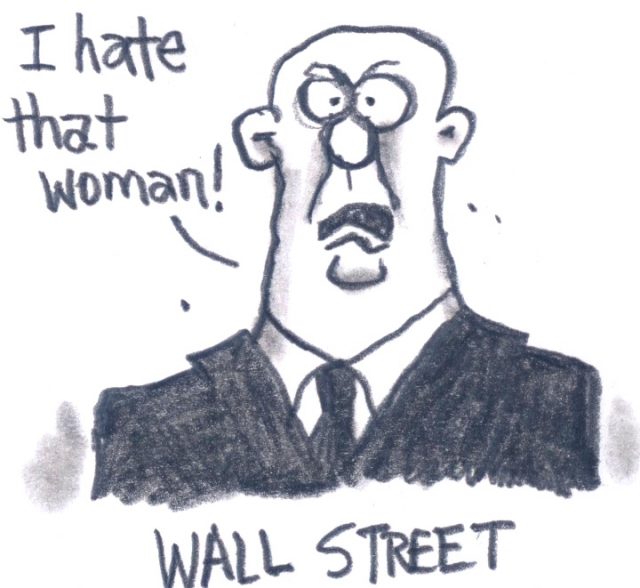
“We have a government that has kissed up to every giant corporation for decades.”
By David Dayen
American Prospect (6/18/19)
We have the most intense concentration of corporate power in America since the Gilded Age of the late 1800s. And Senator Elizabeth Warren has a plan for that, as you might have heard. The presidential candidate has long been one of the few public officials to address the growing dominance of monopolies, and she’s highlighted the problem—and how to fix it—on the campaign trail. (She’s even placed billboards demanding the breakup of Big Tech in Silicon Valley’s backyard.)
I had a chance to talk with Warren between Senate votes in Washington. We discussed how she talks about monopolies to the public, what Congress can do with its authority, and building an antitrust movement.
David Dayen: We’re doing this issue about economic concentration. And one thing I’ve noticed is that, probably since 1912 there hasn’t been this much talk about monopoly in a presidential context, in a presidential race. To what do you attribute that? I mean, why do you think this issue has inspired this interest at this time?
Elizabeth Warren: I believe the central question in America today is who government works for. Yeah, it’s got a lot of different directions, but that’s the fundamental one. Is it just going to work for the rich and the powerful, or is it going to work for everyone else? Antitrust cuts right to the heart of that. We’ve had a government that has kissed up to every giant corporation for decades. It has weakened antitrust enforcement, looked the other way on mergers, passed on deals that everyone knew were anti-competitive and would be bad for the economy and bad for competition but good for the bottom line of the companies that wanted it. And no one so much as fluttered an eyelash over it. And that’s started to change. And I think—So here’s my thinking: it’s because we’re focusing more on what’s wrong in this country. It’s not like somebody woke up and just said “antitrust”—we’re not that nerdy—but it’s about what’s wrong in this country. And as people increasingly see that the problem is not an overreaching government, the problem is a government that won’t get in the fight on the side of the people. Antitrust becomes one of the clearest places to see that.
DD: Now you did a speech at the end of 2017, you talked about this issue, and at the beginning of the speech you said something like, you know, people don’t have to know the Herfindahl-Hirschman Index to know that there’s something wrong.
EW: Exactly.
DD: But how do you talk about it on the trail? How do you talk about it to really drive that home so that it doesn’t get bogged down in numbers and economic theory and stuff like that?
EW: It’s important to give examples of how it touches people’s lives. So when I talk about Amazon, for example, I talk about the platform where everybody goes to buy coffee makers and pet cookies, and that the platform works great. But that Amazon does something extra. It’s not just an ordinary marketplace. It’s a marketplace where Amazon, the owner of the platform, sucks up information from every transaction and every near-transaction, the fact that a shopper looked at the item, right, searched for the item, spent a little time hovering, it’s been in your cart.
And I talk about that. And then they use that information to go into competition with the businesses that are trying to sell you coffee makers or pet cookies. …
Read the Rest and 12-Minute Audio
“The problem is a government that won’t get in the fight on the side of the people.”
— Sen. Elizabeth Warren
(Commoner Call cartoon by Mark L. Taylor, 2019. Open source and free for non-derivative use with link to www.thecommonercall.org )

